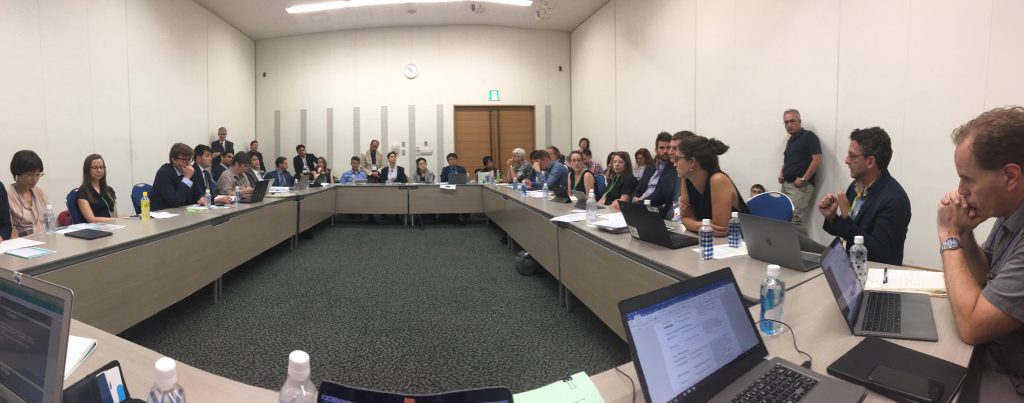IACL Younger Scholars Forum (Fukuoka, 25 July 2018) – A Brief Overview
‘Technology and Innovation: Challenges for Traditional Legal Boundaries’ Workshop
The 20th Congress of the International Academy of Comparative Law (IACL) took place this year in Fukuoka, Japan, between 22-28 July. Apart from bringing together established comparative law scholars from different fields and jurisdictions, the Congress also hosted the first edition of the IACL Younger Scholars Forum, convened by Richard Albert(Professor of Law at the University of Texas at Austin), the former president of the Younger Comparativists Committee of the American Society of Comparative Law.
With this occasion, 200 young scholars around the world had the opportunity to engage in an international academic debate and discuss their research through eight different workshops. Sofia Ranchordás (Professor of European and Comparative Public Law, University of Groningen), Andras Koltay (Associate Professor of Constitutional Law, Pázmány Péter Catholic University) and I had the pleasure of organizing one of the eight workshops, titled ‘Technology and Innovation: Challenges for Traditional Legal Boundaries’. The workshop covered discussions on 23 papers, which we grouped around 6 different themes: Privacy and Data Protection; Media Law and Free Speech; Challenges in Intellectual Property; Online Platforms; Business Law, Blockchain & RegTech, and AI Law. Young scholars from around the world were in attendance and their papers were commented upon by the Distinguished Provocateur-Discussant (Sofia Ranchordas), with the purpose of stimulating the consideration of new angles for their submissions.

Encouraging the engagement of young researchers in law and technology is timely due to the increased academic and societal attention to matters arising out of fast-paced technological developments. In brief, some of the papers tackled the notion of jurisdiction when dealing with big data regulation (Andrew Woods, Jeanne Huang), others focused on freedom of speech, defamation and the right to publicity (David Mangan, Pompeo Polito), the benefits and limitations of RegTech (Yueh-Ping (Alex) Yang and Cheng-Yun Tsang),while a number of papers addressed the plethora of issues arising from the platform economy, such as trust (Enguerrand Marique), intermediary liability (Ana Gascón Marcén) or legal design (Rossanna Ducato). A lot of attention was also dedicated to issues relating to machine learning, be it from the perspective of assembling new legal theories (Markus Naarttijärvi) or tackling new issues with old remedies (Marta Infantino and Weiwei Wang).
We would like to thank the organizers, and especially Richard Albert, for the wonderful opportunity of convening a special event dedicated to young scholars, as well as for including law and technology as a (much needed) workshop theme. The full list of presenters and papers can be found below. If you are interested in any paper, we warmly encourage you to reach out to its respective author.
Elena Falletti (Università Carlo Cattaneo) – Wearable technology and privacy management: the possible habeas corpus perspective
Paul Wragg (University of Leeds) – Recognising a Privacy-Invasion Tort: The Conceptual Unity of Informational and Intrusion Claims
Andrew Woods (University of Kentucky College of Law) – Litigating Data Sovereignty
Jeanne Huang (Sydney University School of Law) – Chinese Private International Law and Online Data Protection
Itay Ravid (Stanford Law School) – Tweeting#Justice: Audio-Visual Coverage of Court Proceedings in a World of Shifting Technology
Alex Reiss Sorokin (Massachusetts Institute of Technology) – The World’s Largest Neighborhood Watch: Between the Local and the Global in Facebook’s Regulation of Speech Online
David Mangan (City University of London) – Information Technology: The Impetus for Legal Innovation
Pompeo Polito (Sapienza University) – The Right of Publicity in the Age of Social Network
Althaf Marsoof (Nanyang Technological University) – The Liability of Internet Intermediaries for Trade Mark Infringements: Reforming the Law Through a Trans-Atlantic Comparison
Chien-Chih Lu (UC Berkeley School of Law) – Innovative Music Technology and Legal Reform
Enguerrand Marique (Digital platforms economy: Towards a renewed understanding of trust?)
Ana Gascón Marcén (University of Zaragoza) – Roles and responsibilities of Internet Intermediaries and human rights: the great debate in Europe with an impact on the rest of the world
Rossanna Ducato (Université Catholique de Louvain) – Transparency by (Legal) Design: Rethinking Information Duties in the Platform Economy
Aneta Tyc (University of Lodz, Poland) – The Platform Economy: How Can Labour and Employment Laws Respond to Challenges Triggered by the New Business Model?
Yueh-Ping (Alex) Yang (National Taiwan University) and Cheng-Yun Tsang (National Chengchi University) – RegTech and the New Era of Financial Supervision: Envisaging More Public-Private-Partnership Models of Financial Supervisors
Alexandra Horváthová (University of Copenhagen) – Effect of Digitalization on Corporate Governance: Will Blockchain Create Greater Efficiency and Transparency? Some Introductory Thoughts
Emerson Banez (University of the Philippines) – Constructing Legal Ontologies for Comparative Law – Exploring Applications for Human and Machine Learning
Mayu Terada (International Christian University) – AI (Artificial Intelligence) Network and the Risk –Possible Legal Framework on AI Research and Development
Marta Infantino and Weiwei Wang (University of Trieste) – Algorithmic Torts: A Prospective Comparative Overview
Mateusz Piątkowski (University of Lodz) – The Future of Lethal Autonomous Weapons Systems in the Light of International Humanitarian Law
Markus Naarttijärvi (Umeå University) – Technological Obscurity and Qualitative Legality
| Originally posted on Mepli.eu More blogs on Law Blogs Maastricht |